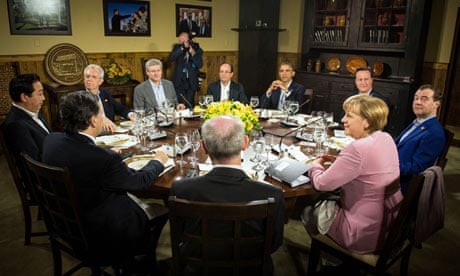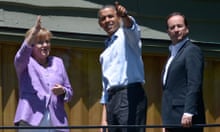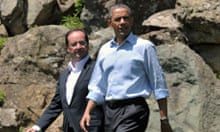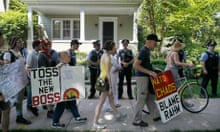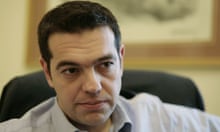The eurozone crisis is set to dominate the Group of Eight (G8) talks Saturday, with President Barack Obama pledging leaders' commitment to a compromise package of growth measures and fiscal responsibility.
Obama, speaking at the opening of the session, confirmed they will focus on measures to prevent the break-up of the eurozone, in particular the potential exit of Greece.
But there remains a huge gulf between the European leaders over how to kick-start the economy, a clash between the pro-growth French approach and the deficit-cutting approach of the Germans.
"All of us are absolutely committed to making sure that growth and stability and fiscal consolidation are part of an overall package," Obama said today.
As he spoke, German chancellor Angela Merkel and British prime minister David Cameron nodded in agreement.
Cameron, after meeting the US leader early Saturday morning, said there has already been good progress on the euro issue and a "a sense of urgency".
Obama met the G8 leaders at his presidential rural retreat Camp David on Friday night, hosting a dinner that was dominated by Iran, Syria and other international issues.
The bulk of the agenda Saturday is being given over the euro crisis, with the new French president François Hollande lined up with Obama in favour of a stimulus package and Merkel holding out.
Also attending are Canada's prime minister, Stephen Harper, the Italian prime minister, Mario Monti, the Japanese prime minister, Yoshihiko Noda, and the Russian prime minister, Dmitri Medvedev, who is attending in place of the Russian president, Vladimir Putin. There are also two European Union representatives.
At the dinner of Friday night, there was broad agreement over forthcoming talks on dealing with the Iranian nuclear stand-off.
Following the private event, Obama told reporters that all those gathered were "firmly committed" to continuing with sanctions alongside diplomatic efforts to pressure Tehran.
He added: "Our hope is that we can resolve this issue in a peaceful fashion that respects Iran's sovereignty and its rights in the international community, but also recognises its responsibilities."
The US, Britain, Germany and France, along with Israel, have been putting the squeeze on Iran, claiming it is engaged in a covert attempt to secure a nuclear weapons capability. Tehran denies this.
The group said they did not expect all the issues to be resolved at the forthcoming meeting in Baghdad but they hoped the Iranians realised they would need to take concrete steps.
Leaders also discussed Syria, ruling out military intervention and instead agreeing to stick with a plan drawn up by former UN secretary general Kofi Annan.
Obama said G8 countries were "supportive of the Annan plan", but added that it "has to be fully implemented".
They also expressed a determination that, with a death toll of 6,000 already in Syria, there has to be a move towards political transition from the regime of Syrian president Bashar al-Assad.
Russia, a traditional ally of Syria, has been resisting tougher international action but Medvedev acknowleged at the meeting there would have to be transition.
The differences are over how to achieve that.
